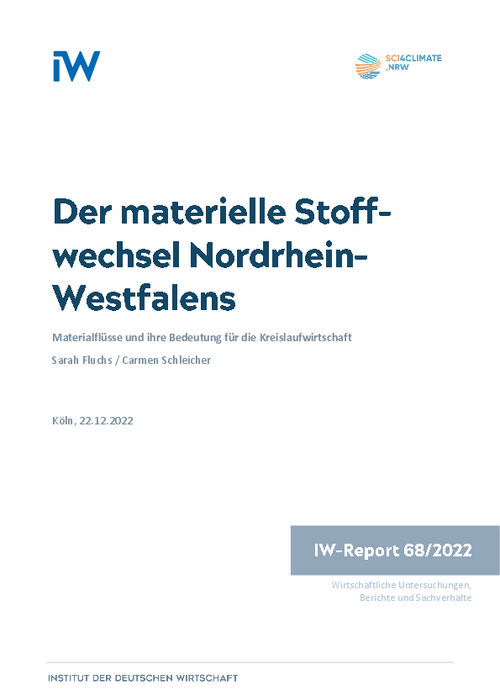The current use of natural resources exceeds planetary limits and thus endangers the resilience of the Earth's ecosystem. The growing consumption of raw materials and the resulting increase in waste and emissions constitute a long-term threat to the environment and thus to the basis of human life.

The material metabolism of North Rhine-Westphalia: Material flows and their significance for the circular economy

The current use of natural resources exceeds planetary limits and thus endangers the resilience of the Earth's ecosystem. The growing consumption of raw materials and the resulting increase in waste and emissions constitute a long-term threat to the environment and thus to the basis of human life.
The German economy is also affected by the depletion of natural raw material reserves and must diversify and sustainably manage its supply of critical raw materials in particular. Against this background, too, the implementation of a circular economy is an important step towards maximizing the lifetime of products and reducing the use of resources and the volume of waste. In order to achieve these goals, consistent political support is necessary, which includes and analyzes the physical material flows in particular, in order to derive goals for a more efficient use of resources and to monitor and accompany the transition process. Material flow analysis (MFA) is a key method for deriving indicators for the study of the circular economy from the material flows identified.
This paper presents the material metabolism of North Rhine-Westphalia (NRW) and identifies its importance for the circular economy. To investigate to what extent a circular economy is taken into account, the political framework conditions applicable in NRW are analyzed. In addition, the effectiveness of selected framework conditions is assessed based on the calculated indicators within the framework of the MFA and verified for NRW.
Essential results concerning the material flows in NRW are:
- In NRW, approximately four times more material is mined than is utilized in production and consumption processes, which illustrates a low efficiency in raw material extraction. To a large extend, this ratio depends on geological and technological factors. Approaches to increase resource efficiency can contribute to a reduction in material use.
- NRW imports almost twice as much material from the rest of the world than from other federal states, and there has been an overall rising import trend since 1994. In terms of the level of production, NRW has recorded an increase in the amount of fossil fuels imported as raw materials from the rest of the world.
- In recent decades, NRW has exported a constant amount of material to other German federal states, while exports to the rest of the world have increased. Overall, exports have increased by around 30 percent since 1994: Among them, mainly the export of fossil energy sources as raw materials.
- The various indicators depicting NRW's resource productivity show an increasing trend over time. Although resource productivity and gross domestic product are rising, direct material input remains at a constant level, which means that there is no absolute decoupling of economic growth from material input.
The analysis of material flows and policy measures for a circular economy in NRW show that material flows have not been sufficiently considered in the political discourse so far. In particular, data gaps and methodological obstacles lead to MFA results at the federal state level that are not fully comprehensive. This is where policymakers must take stronger action in the future and use this data basis to formulate targets and evaluate target achievement in order to meet the need for a stringent resource policy.

The material metabolism of North Rhine-Westphalia: Material flows and their significance for the circular economy

More on the topic
Financing the Sustainability Agenda
The EU has set legally binding targets for climate-neutrality by 2050. To succeed in the transition to a low-carbon economy, companies need to continuously develop new and improved climate-friendly technologies, and to adopt or move towards low-carbon business ...
IW
Due Diligence - Effect of Supply Chain regulation: Data-based results on the effects of the German Supply Chain Act
After the agreement of the European Parliament and the Council of the EU in December 2023, a few formal steps remain to introduce the Corporate Sustainability Due Diligence Directive (CSDDD).
IW